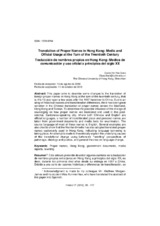Mostrar el registro sencillo del ítem
Translation of Proper Names in Hong Kong: Media and Official Usage at the Turn of the Twentieth Century
| dc.contributor.author | Ho Yan Chan, Clara | |
| dc.date.accessioned | 2020-02-04T09:28:48Z | |
| dc.date.available | 2020-02-04T09:28:48Z | |
| dc.date.issued | 2018 | |
| dc.identifier.issn | 1579-9794 | |
| dc.identifier.uri | http://hdl.handle.net/10396/19457 | |
| dc.description.abstract | This paper aims to describe some changes to the translation of foreign proper names in Hong Kong at the turn of the twentieth century, that is, the 10-year span a few years after the 1997 handover to China. Due to an array of historical reasons and transliteration differences, there has been great variation in the Chinese translation of proper names across the Mainland, Hong Kong and Taiwan. To determine the possible influence of the change of sovereignty on how proper names are translated and used in this postcolonial, Cantonese-speaking city, where both Chinese and English are official languages, a number of transliterated place and personal names are taken from government documents and media texts for examination. The source language of most of these names is English. Several examples are also cited to show that the Mainland media has also adopted translated proper names customarily used in Hong Kong, indicating language borrowing is taking place. An attempt is made to theoretically explain the underlying causes of this translational change using Lefevere’s “rewriting” perspectives of patronage, ideology and poetics, and general theories on language change | es_ES |
| dc.description.abstract | Este artículo pretende describir algunos cambios en la traducción de nombres propios extranjeros en Hong Kong a principios del siglo XX, es decir, durante los primeros diez años desde su entrega en 1997 a China. Debido a una serie de razones históricas y diferencias de transliteración, se ha producido una gran variación en la traducción de nombres propios en China continental, Hong Kong y Taiwán. Para determinar la posible influencia del cambio de soberanía en la forma en que se traducen y utilizan los nombres propios en esta ciudad postcolonial de habla cantonesa, en la que tanto el chino como el inglés son idiomas oficiales, se han extraído una serie de nombres de personas y lugares transliterados de documentos gubernamentales y de textos pertenecientes a los medios de comunicación para su posterior análisis. El idioma de origen de la mayoría de estos nombres es el inglés. También se citan varios ejemplos para demostrar que los medios de comunicación de la China continental también han adoptado nombres propios traducidos que se utilizan habitualmente en Hong Kong, lo que indica que se están realizando préstamos. En este estudio se explican teóricamente las causas subyacentes de este cambio traslacional utilizando las perspectivas de "reescritura" de Lefevere sobre el patrón, la ideología y la poética y las teorías generales sobre el cambio de idioma. | es_ES |
| dc.format.mimetype | application/pdf | es_ES |
| dc.language.iso | eng | es_ES |
| dc.publisher | UCOPress | es_ES |
| dc.rights | https://creativecommons.org/licenses/by-nc-nd/4.0/ | es_ES |
| dc.source | Hikma 17, 95-115 (2018) | es_ES |
| dc.subject | Proper names | es_ES |
| dc.subject | Hong Kong | es_ES |
| dc.subject | Governments documents | es_ES |
| dc.subject | Media Reports | es_ES |
| dc.subject | Rewriting | es_ES |
| dc.subject | Nombres propios | es_ES |
| dc.subject | Documentos de gobierno | es_ES |
| dc.subject | Informes de los medios | es_ES |
| dc.subject | Reescribir | es_ES |
| dc.title | Translation of Proper Names in Hong Kong: Media and Official Usage at the Turn of the Twentieth Century | es_ES |
| dc.title.alternative | Traducción de nombres propios en Hong Kong: Medios de comunicación y uso oficial a principios del siglo XX | es_ES |
| dc.type | info:eu-repo/semantics/article | es_ES |
| dc.relation.publisherversion | https://www.uco.es/ucopress/ojs/index.php/hikma/index | es_ES |
| dc.rights.accessRights | info:eu-repo/semantics/openAccess | es_ES |

